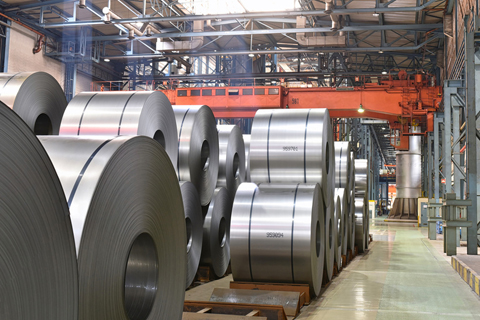Nippon Steel succefully develops Antiviral Photocatalytic
by David Fleschen

Antiviral steel sheets are now being developed. Nippon Steel Corporation (Nippon Steel) is pleased to announce that it has developed a process to make visible-light responsive photocatalytic steel sheet that provides health-promoting antiviral effect obtained by using titanium oxide. Titanium oxide is known as a substance that is activated by light energy and that has strong oxidizing properties, which produce an antiviral effect as well as having antibacterial, deodorant, and anti-allergenic effects.
Nippon Steel has developed this innovative product feature by adding a photocatalytic function to a surface-treated steel sheet. It is this function which gives antiviral effects and other new properties to the steel sheet, as an addition to its aesthetic appearance, corrosion resistance, fingerprint resistance, and other existing properties. The photocatalytic layer of the steel sheet remains even after the steel is to make parts of assembled products.
The photocatalytic steel sheet can be used particularly for products that may be touched by the general public or be in places where virus-laden droplets and aerosol particles may spread and constitute a health risk. Interiors of offices, hospitals, schools, and care facilities, as well as public restrooms, elevators, partitions, and display racks are among the potential applications.
Nippon Steel’s development team’s work in adding a photocatalytic function to various surface treated steel sheets – a function having a health-promoting antiviral effect – includes enhancing the performance and functionality of the company’s existing hairline-finished electroplated steel sheet, FeLuce*, by adding a photocatalytic function. To evaluate the product’s antiviral performance at a low-illuminant level, similar to actual indoor application environments, antiviral testing according to the industry standard JIS R 17561 was conducted. The test confirmed that 99.99%2 of virus on the steel sheet was inactivated at 500 lx illuminance level (Figure 1). Further, addition of a photocatalytic function does not change the visual attractiveness of products made of FeLuce.
* For more information on FeLuce, which won the Good Design Award in 2020, see the website https://www.nipponsteel.com/en/product/feluce/
Nippon Steel is currently undertaking verification tests of other surface-treated steel sheets to see whether addition of a photocatalytic function produces similar antiviral effects as in the case of FeLuce.
Plans call for commercializing a group of photocatalytic steel sheets within this fiscal year. Also being conducted is a verification test of the effect of the new photocatalytic steel sheet of inactivation of coronavirus.
While various antiviral agent spray and application services are available in the society, Nippon Steel’s photocatalytic steel sheets can be used for various products, contributing to reduction in their construction and maintenance work and their costs. In pursuit of world-leading technology and manufacturing capabilities, Nippon Steel sees this newly improved function as an example of company activities in line with the SDGs by contributing to social development.
Source: Nippon Steel, Photo: Fotolia

